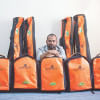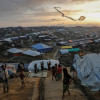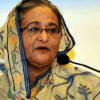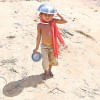Diphtheria cases keep coming up
Although the first round of diphtheria vaccination is over in Cox's Bazar, new cases of infection among the Rohingyas and the locals continue to be reported in the district every day.
A total of 4,700 Rohingyas suspected to have diphtheria are living in the camps in Ukhia and Teknaf while 32 Rohingya children have already died from the bacterial disease.
The alarming point is that 36 Bangladeshis have also contracted it. Most of them are adult, aged above 20. They are from Ukhia and they all visited nearby Rohingya camps, said officials.
The Bangladesh government and several international organisations have already completed the first round of a mass vaccination programme in and around the camps and also among the locals.
About 316,000 Rohingya children were vaccinated last month, according to a statement by the World Health Organisation. They would need two more doses, it said.
In the meantime, health workers are vaccinating another 200,000 Bangladeshi children who live in communities near the refugee settlements in the two upazilas.
The second round of the vaccination will start on January 27.
Cox's Bazar Civil Surgeon Abdus Salam told The Daily Star yesterday, “Diphtheria is still being detected in people, but the situation is under control. The rate of suspected cases will fall when the second round of vaccination will be completed.”
The first recent suspected case, in a woman aged about 30, was reported on November 10 at an MSF clinic in a Rohingya camp in Ukhia. It was confirmed through a lab test on December 4.
Children are particularly vulnerable to diphtheria, a bacterial infection that causes dead tissues to build up over the throat and tonsils. The disease also produces a toxin affecting other organs. It can lead to difficulties in breathing, heart failure, paralysis and even death.
There had been no reported diphtheria case in Bangladesh for the last 35 years. But the highly contagious disease, long forgotten in most part of the world due to increased vaccination, has made a sudden comeback.
Diphtheria transmission occurs from person to person through droplets such as coughing and sneezing and close physical contact. It can be treated by drugs and prevented by vaccine.
According to published data, in Bangladesh the last case of diphtheria in throat was detected in 1976 and on skin in 1983.
Nearly one million Rohingya refugees, including more than 6,55,000 who fled Myanmar since August 25 -- live in overcrowded camps spreading over these two upazilas.
Bangladesh earlier implemented mass vaccination programmes for cholera, polio and measles in Rohingya camps and among the local communities in the area.
Meanwhile, Unicef recently warned that hundreds of thousands of children are already living in horrific conditions in the Rohingya camps.
It also said Unicef and its partners have launched a diphtheria vaccination campaign, and are working to provide children and families with access to safe water and sanitation facilities, but overcrowding and the growing risk of extreme weather increases the risk of further outbreaks.
Misbah Uddin Ahmed, Ukhia upazila health and family planning officer, however, said, “The rate of suspected diphtheria report has fallen. Around 50-60 Rohingya children are being reported everyday but the death rate has fallen sharply. The second and third round vaccination will bring the situation under full control.”

 For all latest news, follow The Daily Star's Google News channel.
For all latest news, follow The Daily Star's Google News channel. 








Comments